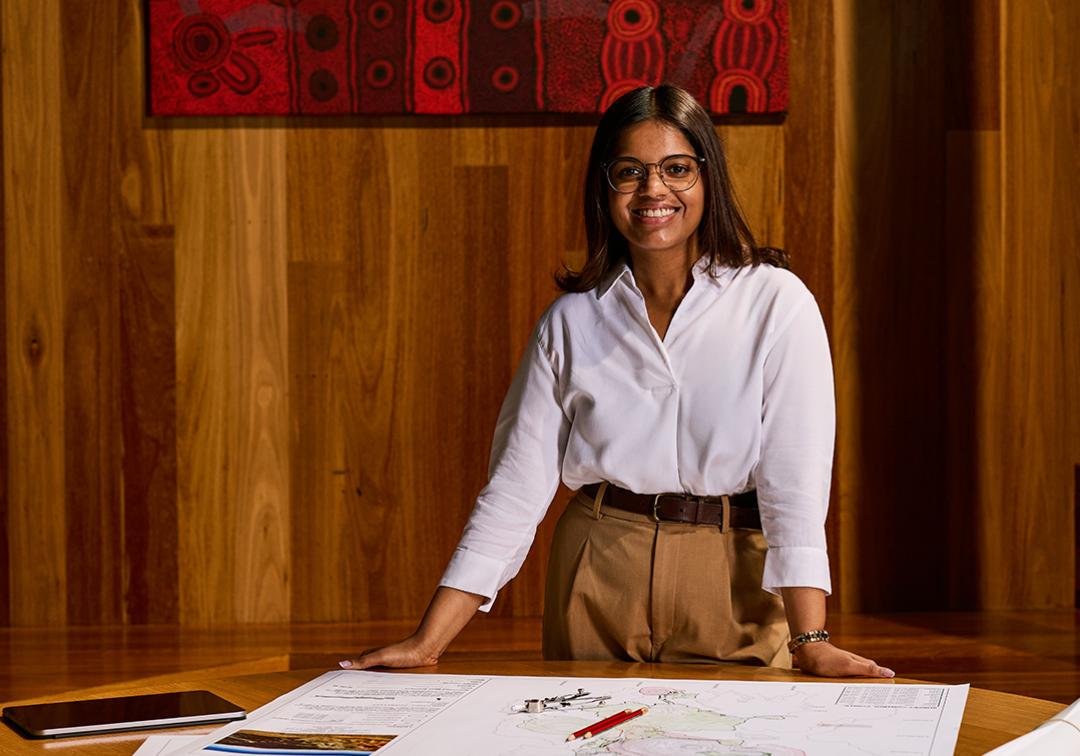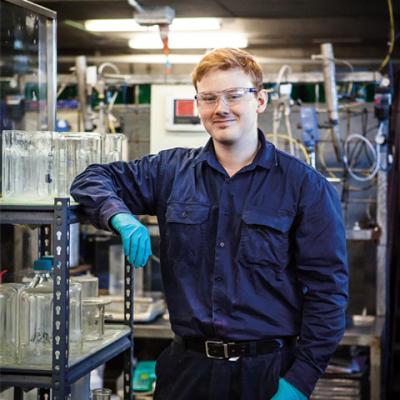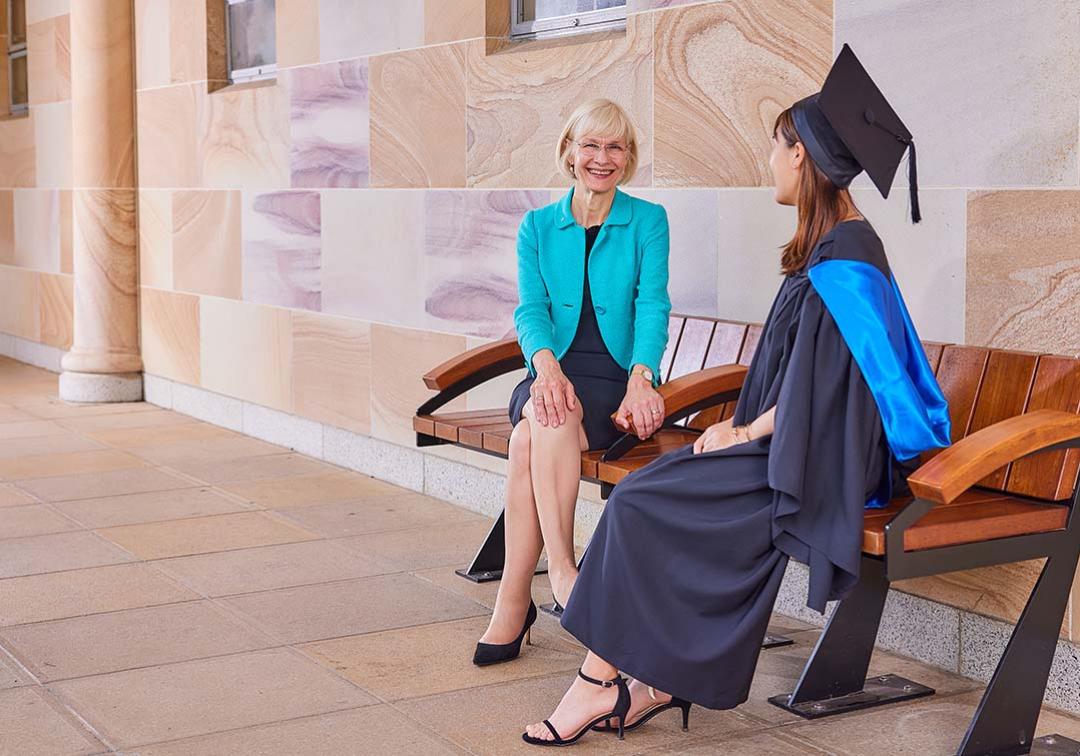
Bachelor of Engineering (Honours) and Master of Engineering
Overview
Develop the skills and knowledge you need to get a head start in an engineering career that requires specialist skills and adaptability, or to give you the edge when applying for a higher degree by research.
This 5-year program is designed to give you an overall education in engineering as well as specialist knowledge in fields such as civil or software engineering. You'll graduate job-ready with a comprehensive knowledge of engineering and a range of practical skills.
You'll undertake a full-time placement with industry or a research institution either in Australia or overseas, and complete advanced coursework and project work in your final year.
You'll also undertake a supervised master's thesis on a relevant topic and be involved with all aspects of research, including defining a research question, establishing a methodology and reporting on your findings.
Fourth-year students have the opportunity to study overseas with the European Double Degree program. This allows you to learn from some of the best engineering and technical teachers in the world, and graduate with an additional master's degree from one of our partner universities.
Program highlights
- Learn from world-class teachers with more national teaching awards than any other Australian university.
- Graduate fully prepared for the workforce with a specialised undergraduate and postgraduate degree.
- Gain practical experience by undertaking a full-time industry placement, or completing a research project with a university or research institution in Australia or overseas.
- Acquire the engineering qualifications that set you apart in the job market, prove your leadership material and provide a pathway to future research or learning.
Majors
Tailor your studies to suit your goals. This program offers these options:
- Chemical and Biomedical Engineering
- Chemical and Bioprocess Engineering
- Chemical and Environmental Engineering
- Chemical and Metallurgical Engineering
How you'll learn
Your learning experiences are designed to best suit the learning outcomes of the courses you choose.
- Lectures
- Tutorials
- Work placements
- Overseas study
- Research experience
- Studios
- Workshops
What you'll study
At UQ, degrees are called 'programs' and subjects are called 'courses'. Here's a sample of the courses you could study in this program:
- Engineering Modelling and Problem Solving
- Engineering Thermodynamics
- Principles of Biological Engineering
- Engineering Mechanics: Statics and Dynamics
Career possibilities
Our programs prepare you for your first job and beyond. Depending on which major you choose, here are some of the careers you could be on your way to:
- Chemical engineer
- Biomedical engineer
- Process engineer
- Wastewater treatment engineer
- Senior plant metallurgist
- Civil engineer
- Building compliance auditor
- Protection and automation engineer
- Software engineer
- Aircraft maintenance engineer
Graduate salary
Engineering (postgraduate)
compared.edu.au
Graduate salary
Engineering (undergraduate)
compared.edu.au
Next steps after graduation
87.9% of our engineering graduates found employment (2019 Graduate Outcomes Survey)
Program accreditation
The Bachelor of Engineering (Honours) and Master of Engineering is accredited by:
- Engineers Australia
Events
See all events
29 June
Queensland Biology Winter School, Year 12

1 July
International Baccalaureate Research Skills Program
Stories
See all stories
Uni life
What’s it like to study resource development (mining) as a postgraduate?
6-minute read

Study tips
5 must-study environment and sustainability courses
8-minute read
Stories
See all stories
Uni life
What’s it like to study resource development (mining) as a postgraduate?
6-minute read

UQ people
From firefighting robots to rocket science: Vennkkata’s UQ experience
5-minute read

Study tips
5 must-study environment and sustainability courses
8-minute read
Entry requirements
Prerequisites
Studying Specialist Mathematics (Units 3 & 4, C) and both Chemistry and Physics is recommended as students will have increased flexibility in their studies.
Prerequisites
Studying Specialist Mathematics (Units 3 & 4, C) and both Chemistry and Physics is recommended as students will have increased flexibility in their studies.
Entry score threshold
| ATAR / Rank | IB |
|---|---|
| 97 | 41 |
These are the lowest adjusted scores we made an offer to in Semester 1, 2025. Entry scores are based on the most recent Semester 1 intake and are updated in April each year. Meeting the entry score threshold doesn't guarantee admission.
Guarantee your place at UQ: If you meet our guaranteed minimum ATAR you could secure an offer for your preferred program.
English language requirements
IELTS overall 6.5; reading 6; writing 6; speaking 6; listening 6. For other English Language Proficiency Tests and Scores approved for UQ
TOEFL iBT (including Paper Edition) - Overall 87, listening 19, reading 19, writing 21 and speaking 19.
PTE Academic - Overall Score of 64 and 60 in all sub bands.
BE - A minimum overall grade of 4 plus a minimum grade of C in all macro skills.
CES - Overall 176 and 169 in all sub bands.
OET is not accepted.
There are other ways to meet the English language requirements. For some programs, additional conditions apply.
Inherent requirements
To complete this degree, you have to meet its inherent requirements by demonstrating essential skills and attributes. Read the inherent requirements before you apply.
Student visas
International students who are accepted into full-time study in the Bachelor of Engineering (Honours) and Master of Engineering are eligible to apply for an Australian student visa (subclass 500).
There are a number of requirements you must satisfy before a visa is granted, including the Genuine Student (GS) requirement.
Entry score range
This table shows the range of entry scores for recent secondary students offered a place in the B Engineering (Hons)/M Eng for Semester 1, 2025
| Without adjustments | With adjustments | |
|---|---|---|
| Highest | 99.9 | 99.95 |
| Median | 97.85 | 99.95 |
| Lowest | 92.05 | 97 |
Who you'll study with
Here's a snapshot of our student intake for this program in Semester 1, 2025:
| Applicant background | Number of students | Percentage of all students |
|---|---|---|
(A) Higher education study | 15 | 4.1% |
(B) Vocational Education and Training (VET) study | N/P | N/P |
(C) Work and life experience | 0 | 0% |
| (D) Recent secondary education | ||
| 334 | 90.3% |
| 0 | 0% |
| <5 | <5 |
International students | 13 | 3.5% |
Total | 370 | 100% |
"<5" — The number of students is less than 5.
N/A — Students not accepted in this category.
N/P — Not published. The number is hidden to protect the privacy of students in other cells.
Need help meeting the entry requirements?
Additional application information
Majors
Fields of study
Tailor your studies to suit your goals. This program offers these options:
Fields of study
Tailor your studies to suit your goals. This program offers these options:
Fees and Scholarships
Indicative annual fee
Approximate yearly cost of tuition (16 units). Your fees will vary according to your selected courses and study load. Fees are reviewed each year and may increase.
$8,170
2026
Approximate yearly cost of tuition (16 units). Your fees will vary according to your study load. Fees are reviewed each year and may increase.
AUD $58,056
2026
Government assistance
Financial aid
As an international student, you might be eligible for financial aid – either from your home country, or from the Australian Government.
HECS-HELP
Domestic places in the Bachelor of Engineering (Honours) and Master of Engineering are Commonwealth supported, as long as you meet all Commonwealth supported place eligibility requirements.
This means the cost of your education is shared between you and the Australian Government. Instead of tuition fees, Commonwealth supported students pay what are called student contribution amounts.
If you have a Commonwealth supported place, you may also be eligible for HECS-HELP. This is an Australian Government loan scheme to assist eligible students with the cost of their student contribution amounts.
Centrelink support
The Australian Government offers a number of income-support payments to eligible Australian university students.
Scholarships
You may be eligible for more than 100 scholarships, including:
How to apply
Applying online
If your senior schooling is from outside Australia, you can submit your application to UQ. Or, if you prefer, you can use an approved UQ agent near you.
The program code for the Bachelor of Engineering (Honours) and Master of Engineering is 2350.
How to apply for undergraduate study
If your senior schooling is from Australia
Submit your application to the Queensland Tertiary Admissions Centre if you're an international student who is currently studying:
- Australian Year 12 (in Australia or another country), or
- the International Baccalaureate in Australia.
The QTAC code for the Bachelor of Engineering (Honours) and Master of Engineering is 717111.
Applying through QTAC
All domestic applications should be submitted to the Queensland Tertiary Admissions Centre (QTAC).
The QTAC code for the Bachelor of Engineering (Honours) and Master of Engineering is 717111.
Important dates
If you’re studying Year 12 in Australia, go to the QTAC website to check the closing date for this program.
If you’re applying to UQ, the closing date for this program is:
- Direct Entry Applicants: Applications must be lodged via the Online Application Form by May 31 of the year of commencement to commence in semester 2; and by 30 November of the previous year to commence in semester 1. Internal Applicants: Apply via the Program Change Request on my Si-net, by the Friday before Orientation Week each Semester.
Visa processing times vary. Apply and accept your offer as early as you can.
To learn more about UQ dates, including semester start dates, view the Academic Calendar.
Important dates
To check the closing date for this program, go to the QTAC website.
To learn more about UQ dates, including semester start dates, view the Academic Calendar.
Aboriginal and Torres Strait Islander applicants
For support with applying – or if you have any questions about university life – get in touch with our Aboriginal and Torres Strait Islander Studies (ATSIS) Unit.
Explore other programs
Express yourself. And your interest.
They say choosing a degree is hard, which is why we've made it easy. Register your interest and we'll send you everything you need to know about applying to UQ.









